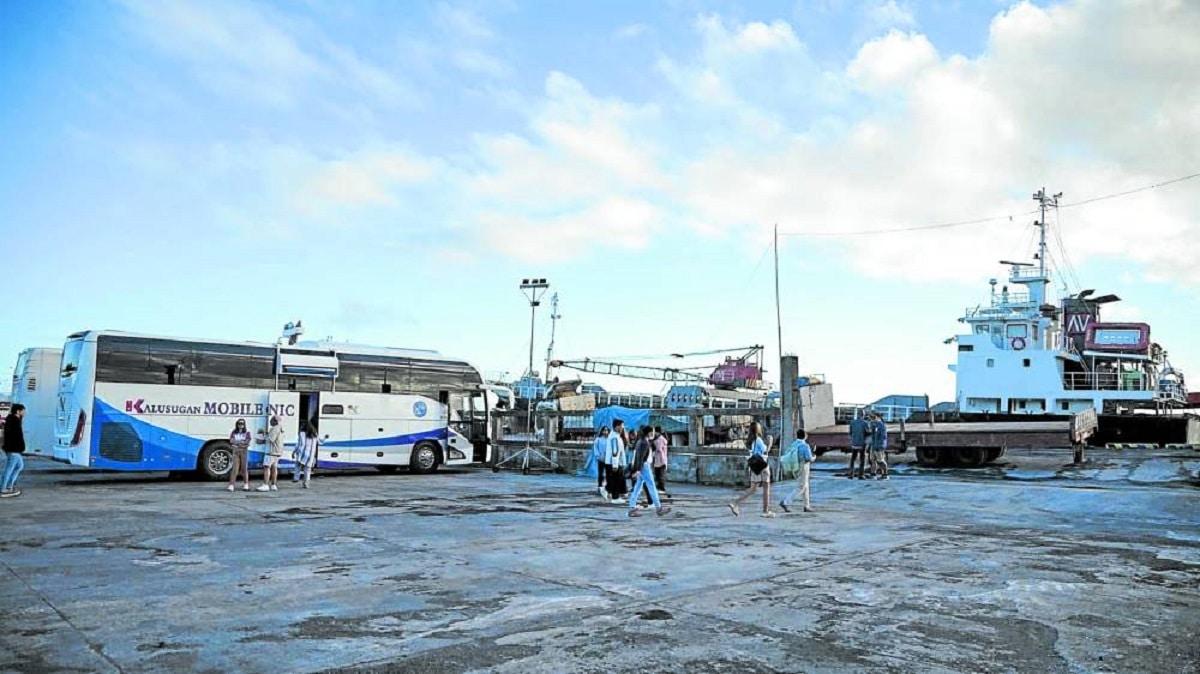
HELP IS ON ITS WAY The aid initiative of Sorsogon for typhoon-hit Catanduanes include sending its mobile clinics to the province, shown here on Tuesday, which are waiting to be loaded to a ferry that will transport them from the Tabaco City port in Albay to the island. —Sorsogon Governor/Chiz Escudero Facebook photo
MANILA, Philippines — Large amounts of assistance have started to arrive in Catanduanes, in the aftermath of Saturday’s Super Typhoon Pepito (international name: Man-yi) that devastated the province.
Along with presidential aid of P50 million and food and material assistance from government agencies led by the Department of Social Welfare and Development (DSWD), the provinces of Albay and Sorsogon also sent teams starting on Tuesday to Catanduanes, bringing with them trucks full of food, housing materials, medical and other basic supplies and water filtration machine to assist the province’s displaced residents.
President Marcos, who visited the province, turned over a P50-million check to Gov. Joseph Cua following an aerial inspection of the capital town of Virac on Tuesday afternoon.
READ: Abaca planters seek help after bad weather
He also observed the distribution of relief aid to displaced residents and assured them that the government would continue to send food packs as well as cash assistance and construction materials to rebuild their damaged homes.
There would be no deadline set for the distribution of food packs, the President assured the displaced residents housed in government shelters or those temporarily living with relatives.
The government will also help typhoon victims in repairing or rebuilding their damaged or destroyed houses by giving cash assistance and construction materials, Marcos added.
“We will also focus on reconstruction … It’s not yet here, but we will also distribute building materials like roofing sheets, lumber, even hammers, and nails so that you can somehow begin repairing your homes,” the President said.
The government will also fast-track the repairs of government buildings and infrastructure so that public services will go unimpaired.
“The biggest problem is the agricultural damage. Catanduanes is the center of abaca production, and many abaca crops were destroyed. So we have to study on how we can replant quickly,” he said in an interview with reporters after a situation briefing at the Catanduanes Provincial Capitol.
The President also assured that the government will prioritize the restoration of telecommunication and power lines to return the province to normalcy.
No casualty
Based on the initial assessment by the Catanduanes Provincial Disaster Risk Reduction and Management Office (PDRRMO), Pepito left over 4,000 houses destroyed and 2,000 houses damaged, mostly in the town of Panganiban, where Pepito made its first landfall on Saturday, packing winds of up to 295 kilometers per hour and gusts of up to 315 kph.
Cua said he was grateful the typhoon left no casualties in his province.
“Thank God everyone is safe. The good news is that there were no reported deaths as Pepito battered the province,” he said in a phone interview on Tuesday.
The governor attributed this achievement to the close coordination among his province’s local governments, disaster response teams, uniformed personnel, and the cooperation of residents who followed preemptive and forced evacuation orders in high-risk areas.
As of Tuesday, over 8,178 families, or 27,001 people, remained in various evacuation centers in the province.
“We greatly appreciate any form of aid from everyone. We are also appealing to electric cooperatives and companies to help us restore power lines as soon as possible to ease the burden on our people,” Cua added.
Norman Laurio, the DSWD director in Bicol, said food assistance from the agency was sent Tuesday to Catanduanes.
Social Welfare Secretary Rex Gatchalian earlier announced that 45,000 food packs would be delivered this week to support affected families in the province.
The Center for Health Development of the Department of Health in Bicol has also deployed medical teams to the province.
Sorsogon sent its first batch of the “Tabang kan Sorsoganon” team to Catanduanes on Tuesday to help in the “ground zero” towns of Panginaban, Viga, Bagamanoc, Gigmoto, Pandan and Caramoan, according to Raden Dimaano, chief of Sorsogon’s PDRRMO.
Sorsogon Gov. Edwin Hamor told reporters Sunday that they prioritized housing materials, including 10,000 coconut lumber logs, in consideration of the widespread damage to the houses in the area. The province’s doctors to the barrios were also deployed along with its mobile medical clinics to provide aid to typhoon victims.
Albay, meanwhile, is donating P1 million to the provincial government of Catanduanes, which will be handed to the province’s officials when the Albay contingent arrives on the island on Friday.
“The impact of Super Typhoon Pepito has been devastating, and we understand the immense challenges faced by our neighbor in Catanduanes. This donation reflects our collective responsibility to help them rebuild and recover,” Albay Gov. Glenda Ong-Bongao said in a statement Monday.
To address the urgent need for clean water, the Albay contingent will bring along a water filtration machine and a lorry to supply potable water to residents in Catanduanes, where access to safe drinking water has been severely disrupted by the typhoon.
Albay’s health office will also deploy on Friday a team of doctors, nurses, and counselors to assist affected Catanduanes residents with both their physical and mental health needs, the statement said.